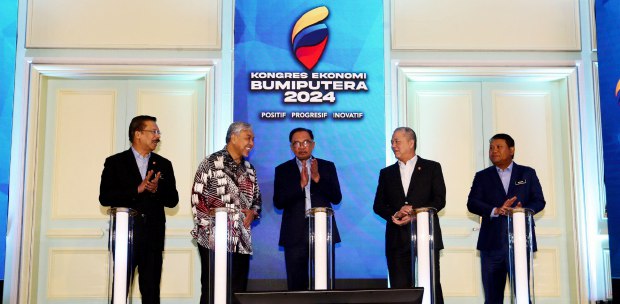THE 2024 Bumiputera Economic Congress (KEB 2024) concluded its proceedings recently.
On the final day, the chairpersons of each cluster formulated their perspectives, and the prime minister delivered the closing speech. Both deputy prime ministers expressed ideas for developing the Bumiputera community during the congress.
Many are now wondering, what comes next?
The prime minister firmly stated that affirmative policies will continue to be implemented as long as there are marginalized groups in the national development agenda. This applies to all communities, both Bumiputera and non-Bumiputera.
The power of an imperfect free market is evident and undeniable. The assumption that everyone stands on an equal footing for fair competition does not reflect the true reality.
Why is this the case? According to leading economist Professor Tan Sri Dr. Noor Azlan Ghazali, Bumiputeras constitute 70 per cent of the Malaysian population, with around 61 per cent residing in states characterised by "low growth, low income, and high poverty" or in other words lesser developed states. These states also have a high Bumiputera population density.
Nevertheless, Professor Noor Azlan stresses that we ought to appreciate that not all Bumiputeras have low incomes, and not all other ethnic groups have high incomes.
Affirmative policies must target all marginalized groups. However, it must be remembered that Bumiputeras have special privileges outlined in the constitution, requiring more specific affirmative policies.
Is there a risk of Bumiputeras being trapped in this marginalisation? With the characteristics of low growth, low income, and high poverty, this marginalisation gives rise to the real risk of the Bumiputera lagging behind in national development process.
A clear commonality across all clusters is that Bumiputeras must strengthen their knowledge, skills, and talents to ensure their capabilities and potential are at the best level to compete and succeed. Success for Bumiputeras must be achieved through their own competitiveness, and not by taking away the rights of others.
Professor Noor Azlan believes that most opportunities, challenges, and proposed actions have been addressed in KEB 2024. Along these lines undoubtedly, more will be scrutinised later.
Based on the PISA 2022 assessment, a student's achievement in science literacy, mathematics, and reading is significantly influenced by their socioeconomic status (SES). At the age of 15 (the PISA testing age), students from low SES backgrounds (low income, lack of basic learning resources, no role models in the family) are clearly at a disadvantage. Their learning age (learning trajectory) is truncated by nearly four years!
If this continues, Bumiputeras (and other communities as well) facing the entrapment of low SES are at high risk of falling behind.
This raises critical questions about educational equity, socioeconomic disparities, and the potential long-term disruptions.
From the diagram depicting Corporate Sector Equity ownership prepared by Lim Chee Han of Third World Network. It can be seen that the Bumiputera share peaked in 1990 and has been on the decline since. Similarly the non Bumiputera share has been declining, albeit at a slower pace.
Meanwhile foreign ownership has been steadily increasing, while the presence of nominees becoming more pronounced and significant.
Ultimately, all Malaysians should benefit from progress and development, while foreign participation is most welcome. However, ideally no one should get the lion's share.
Redistribution of gains from increased and improved economic activity ought to occur, in fact it is a prerequisite for sustained economic growth. Numerous studies have confirmed this.
In his Prolegomena (The Muqaddimah), Ibn Khaldun, laid down the foundations of different fields of knowledge, in particular the science of civilization (al-'umran). His significant contributions to economics, should place him in the history of economic thought as the "father" of economics. Ibn Khaldun pioneered concepts associated with classical economics which are production, supply, and cost. He also went on topioneer concepts such as consumption, demand, and utility, being the cornerstones of modern economic theory.
In the cyclical theory which charts the rise and fall of Empires, Ibn Khaldun stressed the need for rejuvenation and warned of the consequences of stagnation. The cyclical theory assumes that empiresare like living organisms, they are born, grow up, mature, and die
Let us not loose focus after this. The prime minister has instructed the secretariat to follow up with actions. It is highly expected that each ministry will examine all documents that were submitted and presented. Details on the actions that each ministry should undertake must be outlined.
Thank you, Prime Minister, both deputy Prime ministers for addressing the Bumiputera fate as a national issue. This is our problem. We must solve it.
* The writer is a senior consultant at Global Asia Consulting and has a background as a senior researcher at the Malaysian Institute of Economic Research. The viewpoints articulated are solely those of the author.





